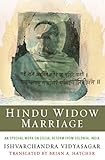Hindu Widow Marriage / Ishvarchandra Vidyasagar.
Material type: TextPublisher: New York, NY : Columbia University Press, [2011]Copyright date: ©2011Description: 1 online resource (272 p.) : 2 tablesContent type:
TextPublisher: New York, NY : Columbia University Press, [2011]Copyright date: ©2011Description: 1 online resource (272 p.) : 2 tablesContent type: - 9780231156332
- 9780231526609
- 306.84 22
- KNS544.W54 B53513 2012
- KNS544.W54 B53513 2012
- online - DeGruyter
- Issued also in print.
| Item type | Current library | Call number | URL | Status | Notes | Barcode | |
|---|---|---|---|---|---|---|---|
 eBook
eBook
|
Biblioteca "Angelicum" Pont. Univ. S.Tommaso d'Aquino Nuvola online | online - DeGruyter (Browse shelf(Opens below)) | Online access | Not for loan (Accesso limitato) | Accesso per gli utenti autorizzati / Access for authorized users | (dgr)9780231526609 |
Browsing Biblioteca "Angelicum" Pont. Univ. S.Tommaso d'Aquino shelves, Shelving location: Nuvola online Close shelf browser (Hides shelf browser)

|

|

|

|

|

|

|
||
| online - DeGruyter Humans, Beasts, and Ghosts : Stories and Essays / | online - DeGruyter New Battlefields/Old Laws : Critical Debates on Asymmetric Warfare / | online - DeGruyter Dying to Forget : Oil, Power, Palestine, and the Foundations of U.S. Policy in the Middle East / | online - DeGruyter Hindu Widow Marriage / | online - DeGruyter Religion, the Enlightenment, and the New Global Order / | online - DeGruyter Speaking for Buddhas : Scriptural Commentary in Indian Buddhism / | online - DeGruyter Spirals : The Whirled Image in Twentieth-Century Literature and Art / |
Frontmatter -- Contents -- Preface -- A Word About the Translation -- Hindu Categories for First-Time Readers -- Chronology. Events Pertaining to the Widow Marriage Movement in Bengal -- Introduction -- HINDU WIDOW MARRIAGE. The Complete English Translation -- Book One -- Book Two -- Glossary -- Bibliography -- Index of Sanskrit Passages -- Index of Names and Terms
restricted access online access with authorization star
http://purl.org/coar/access_right/c_16ec
Before the passage of the Hindu Widow's Re-marriage Act of 1856, Hindu tradition required a woman to live as a virtual outcast after her husband's death. Widows were expected to shave their heads, discard their jewelry, live in seclusion, and undergo regular acts of penance. Ishvarchandra Vidyasagar was the first Indian intellectual to successfully argue against these strictures. A Sanskrit scholar and passionate social reformer, Vidyasagar was a leading proponent of widow marriage in colonial India, urging his contemporaries to reject a ban that caused countless women to suffer needlessly.Vidyasagar's brilliant strategy paired a rereading of Hindu scripture with an emotional plea on behalf of the widow, resulting in an organic reimagining of Hindu law and custom. Vidyasagar made his case through the two-part publication Hindu Widow Marriage, a tour de force of logic, erudition, and humanitarian rhetoric. In this new translation, Brian A. Hatcher makes available in English for the first time the entire text of one of the most important nineteenth-century treatises on Indian social reform.An expert on Vidyasagar, Hinduism, and colonial Bengal, Hatcher enhances the original treatise with a substantial introduction describing Vidyasagar's multifaceted career, as well as the history of colonial debates on widow marriage. He innovatively interprets the significance of Hindu Widow Marriage within modern Indian intellectual history by situating the text in relation to indigenous commentarial practices. Finally, Hatcher increases the accessibility of the text by providing an overview of basic Hindu categories for first-time readers, a glossary of technical vocabulary, and an extensive bibliography.
Issued also in print.
Mode of access: Internet via World Wide Web.
In English.
Description based on online resource; title from PDF title page (publisher's Web site, viewed 02. Mrz 2022)


